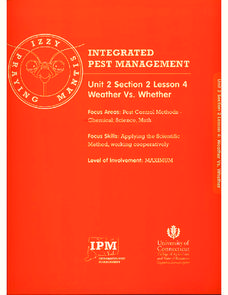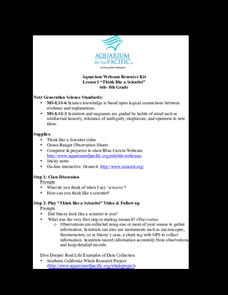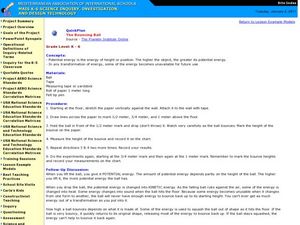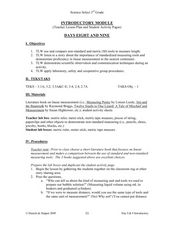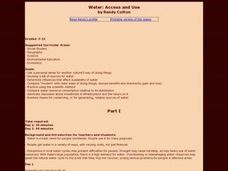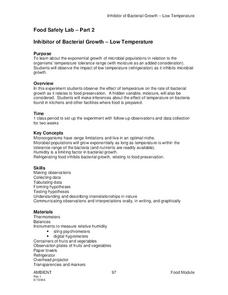University of Connecticut
Weather Vs. Whether
Monarch butterfly populations have decreased by 90 percent over the past 20 years due to misuse and ineffectiveness of some pesticides. Given the challenge to increase pesticide safety and effectiveness, the class, through discussion,...
National Nanotechnology Infrastructure Network
Coffee Break with Nanoscience: Film Formation and “Coffee Rings”
Prepare scholars for micro and nanoscale investigations. A lab activity allows individuals to practice their experimental techniques while becoming to accustomed to the smaller scale of the materials. They also make decisions about the...
Beyond Benign
12 Principle Match Up
Can you find a match? Scholars review the 12 principles of green chemistry by playing a matching game. The second lesson of the series reinforces the principles from the first lesson. Individuals play the matching game and also complete...
NASA
Cleaning Water
Give young scientists a new appreciation of fresh, clean drinking water. After learning about the ways astronauts recycle their air and water, your class will work in small groups creating and testing their very own water...
Wilderness Classroom
Pollution
Educate scholars on pollution—air, water, and land—with a series of lessons that begin with a thorough explanation of each type. Learners then take part in three activities to reinforce the importance of reducing pollution. They...
Benjamin Franklin Tercentenary
Let’s Throw an Electric Science Party!
Are you looking for a shockingly good lesson? Check out one that has middle schoolers recreate four of Benjamin Franklin's experiments. Groups investigate, observe, and draw conclusions about static electricity and electrical current....
National Wildlife Federation
How Many Bison?
Math and science to the rescue! Some basic math concepts help scientists predict wildlife populations. Using tokens, groups simulate tagging a wildlife population. They then use proportions to estimate the population of the wildlife.
WindWise Education
Which Blades Are Best?
If I change the length, will they work better? After brainstorming the variables of wind turbine blade design, groups choose one variable to isolate and test. The groups then present their data to the class in order for all to have the...
University of Minnesota
Inquiry Cubes
How do you teach kids to "science" effectively? Inquiry cubes are a "sort of" puzzle with no answer—promoting even more questions! Group members work together to use the evidence on the visible sides of each cube to infer what lies on...
Curated OER
Open Inquiry Using C. elegans
Ever wondered what motivates a roundworm? Introduce your biology class to C. elegans, a non-parasitic model organism that can help them understand behavioral stimuli. Paired pupils design an experiment to test the worm's reaction to...
Aquarium of the Pacific
Think Like a Scientist
Scholars watch a video and meet a scientist who is studying sharks as she explains her observations about the sharks and provides her hypothesis to explain their behavior. Learners then act like a scientist as they watch an aquarium...
American Chemical Society
Designing an Absorbency Test
Time to soak up some learning! A hands-on lesson plan teaches learners about the absorbency properties of substances. They conduct tests by dipping different materials in water to determine which hold water and then complete a handout to...
Curated OER
More Than Meets the Eye
Young scholars use the Archimedes method to demonstrate scientific principles behind observations.
Curated OER
Sharks in Decline
Students investigate common fishing methods used to capture sharks. They decide why these methods and the shark's reproductive biology are contributing to the quick reduction in the shark population.
Curated OER
The Bouncing Ball
Students use the scientific method to conduct an experiment to test how a ball bounces. In this inquiry-based physical science and scientific method activity, students drop a ball from specified heights and record the rebound, then...
Curated OER
Life Means Water Environment
Students investigate pH levels in bodies of water and experiment with acid/base reactions. In this water and pH lesson, students observe changes in pH levels of a sample solution and observe a Bronsted-Lowry reaction. Students...
Curated OER
Living in Extreme Environments: Havens on the Deep Sea Floor
Students identify the characteristics of an extreme environment in the deep ocean and consider what organisms need to survive in these elements. They research sampling and data collection methods in this environment.
Curated OER
Introductory Module
Third graders examine the non-standard method of measurement and compare it to the metric system of measurement. In this introductory module lesson, 3rd graders discover the scientific observation. Students also develop communication...
Curated OER
Variable Skies
Young scholars examine factors which affect a vortex and create model tornadoes. They identify variables, pose a testable question, and perform an experiment using the scientific method. After they collect their data, students write a...
Curated OER
Diaper Inquiry
Fifth graders carefully examine and investigate the products contained in a diaper. They particularly analyze the crystal sodium polyacrylate, a product developed for use in astronaut diapers. They follow the scientific method, forming...
Curated OER
Water: Access and Use
Students get a personal sense for another culture's way of doing things. Develop a list of sources for water. Practice using the scientific method. Examine means for conserving, or for generating, reliable sources of water.
Curated OER
Earth System Science
Students investigate the age of the earth by using accepted scientific methods. They conduct research about the use of radioactive dating and there is a simulation activity of the process. Finally, students measure the radioactive decay...
Curated OER
Food Safety Lab
Students use the scientific method to investigate the role of temperature in microbial growth. In this food preservation lesson, students set up an experiment with fruit in room temperature and in a refrigerator. They record the...
Curated OER
Characteristics of Living Things
Student use the scientific method to experiment with worms. In this characteristics of living things lesson, students predict and examine the reactions of worms to dry and wet soil. Students share their findings.
Other popular searches
- Scientific Method Worksheet
- Scientific Method Activities
- Scientific Method Variables
- The Scientific Method
- Scientific Method Hypothesis
- Six Step Scientific Method
- Scientific Method Lab
- Scientific Method Powerpoint
- Basic Scientific Method
- Scientific Method Botany
- Scientific Method Lab Report
- Scientific Method Vocabulary
